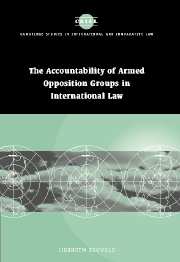Book contents
- Frontmatter
- Contents
- Table of treaties and declarations
- Table of cases
- Table of other documents
- List of abbreviations
- Introduction
- PART 1 THE NORMATIVE GAP
- PART 2 THE ACCOUNTABILITY GAP
- 3 Accountability of group leaders
- 4 Accountability of armed opposition groups as such
- 5 Accountability of the state for acts of armed opposition groups
- 6 The quest for accountability
- Conclusion
- Bibliography
- Index
- CAMBRIDGE STUDIES IN INTERNATIONAL AND COMPARATIVE LAW
4 - Accountability of armed opposition groups as such
Published online by Cambridge University Press: 28 July 2009
- Frontmatter
- Contents
- Table of treaties and declarations
- Table of cases
- Table of other documents
- List of abbreviations
- Introduction
- PART 1 THE NORMATIVE GAP
- PART 2 THE ACCOUNTABILITY GAP
- 3 Accountability of group leaders
- 4 Accountability of armed opposition groups as such
- 5 Accountability of the state for acts of armed opposition groups
- 6 The quest for accountability
- Conclusion
- Bibliography
- Index
- CAMBRIDGE STUDIES IN INTERNATIONAL AND COMPARATIVE LAW
Summary
In order to enforce international law applicable to armed opposition groups effectively, we should be able to involve the group itself as a collectivity. Indeed, the acts that are labelled as international crimes find their basis in the collectivity. These crimes are unlikely to be prevented nor will compliance with the relevant provisions of international law be significantly improved through punishment of one single individual. Therefore, the most challenging level of accountability is the accountability of armed opposition groups as such.
To make armed opposition groups themselves accountable under international law raises a host of problems. The principle that armed opposition groups may be held accountable for wrongful acts committed by them has been recognized. But a number of difficulties remain to be resolved. For one thing, there is the important threshold question of defining armed groups, namely the threshold as to their level of organization and military power. In addition, international bodies have not yet defined the rules on attribution of the acts and omissions of individuals to armed opposition groups. In this regard, the question of attribution to successful armed groups, which have formed either a new government or a new state should also be considered. Another open question is: In what kind of forum could a claim be prosecuted? There is also the question of who has standing to bring a claim, and, who is entitled to represent armed opposition groups in a claim or at an arbitration? The following discussion will address these questions.
- Type
- Chapter
- Information
- Accountability of Armed Opposition Groups in International Law , pp. 133 - 163Publisher: Cambridge University PressPrint publication year: 2002
- 2
- Cited by

